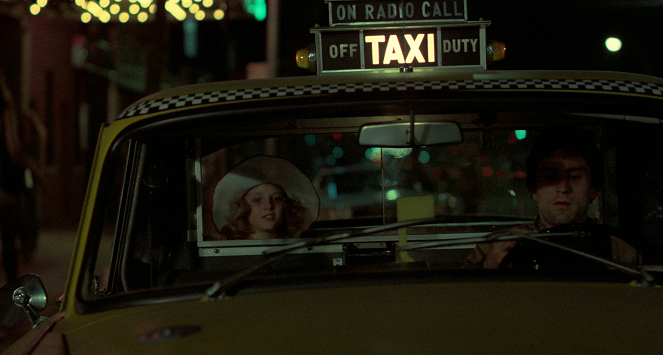Directed by:
Martin ScorseseScreenplay:
Paul SchraderCinematography:
Michael ChapmanComposer:
Bernard HerrmannCast:
Robert De Niro, Jodie Foster, Albert Brooks, Harvey Keitel, Leonard Harris, Peter Boyle, Cybill Shepherd, Diahnne Abbott, Frank Adu, Victor Argo (more)VOD (4)
Plots(1)
Robert De Niro and Jodie Foster star in this highly regarded classic from director Martin Scorsese about a mentally unstable Vietnam War veteran who works as a night-time taxi driver in New York City where the perceived decadence and sleaze feeds his urge for violent action, attempting to save a preadolescent prostitute in the process. (Sony Pictures UK)
(more)Reviews (13)
Scorsese's first major league feature and still one of his most famous. Once again, the master does what he does best, immersing the protagonist chin-deep in the seedy, prostitute- and small-time gangster-infested corners of New York, where no ethical laws apply. As always, the excellent De Niro is amazing in his role and his slow inner transformation is one of the best things of Taxi Driver and enhances its story. Scorsese manipulates the viewer very skilfully, for an hour and a half he just prepares them as they try to identify with the main character, which is very essential towards the final minutes and crucial for the overall impression. The atmosphere is also greatly enhanced by Herrmann's excellent and mysterious music, whose tones are heard at almost every turn. It's just a pity that the narrative wasn't given a smoother and rawer tone, because the bloody finale seems a bit contrasting and absurd in relation to the story as a whole. Taxi Driver is another impressive film from a directing legend, but I'll probably just pass on it again. 80%
()
Legendary American director Martin Scorsese has always had a flair for strong themes and great actors, which he proved with this disturbing crime drama in which the utterly inscrutable Robert De Niro as the frustrated loner Travis navigates the dirty streets of New York in a taxi. Absolutely disgusted with abominable social conditions, he finally decides to take justice into his own hands. The young Jodie Foster as the prostitute Iris gives an emotionally convincing performance here, suggesting that she will one day be a star of the first magnitude. (85%)
()
Taxi Driver is the third best film made by Scorsese and De Niro after Raging Bull and Wise Guys. But of all the above, it has by far the best music - Herrmann's ending to his career is divine. How a few notes can capture not only the environment in which the film takes place, but also the mental turmoil of the main character... It's breathtaking. You see the opening credits (which Richard Donner pays homage to in Gibson's Ransom) and you know - this is going to be SOMETHING. And it is.
()
Taxi Driver is probably a movie that I will appreciate much later than in my twenties. It is a huge reaction to today’s society, which cannot be monitored. It is only possible to fight it, but the question is whether the fight will change the society or the person who is trying to fight against it. In this film, Robert De Niro made it clear that it is easier for him to change than for the society. With that he created an absolutely unbelievable scene towards the ending, which made me really sick. Even worse were the consequences, which could not be overlooked. Martin Scorsese shot a very good film, but I couldn’t deal with its story. And that was the biggest stumbling block. Otherwise, it’s an example of absolutely great filmmaking, which will be hard to match.
()
The dollar may have had significantly more power in the mid-70s than it does today, but the fact remains that the movie only cost a mere 1.9 million, which is unbelievable. Nevertheless, money for the project was hard to come by, and it took a long 3 years for Scorsese and De Niro to make it happen. The screenwriter used a real-life successful assassination attempt on presidential candidate George Wallace in 1972. However, the film is not a crime story in the ordinary sense; rather, it is a psychological drama about a Vietnam War veteran who cannot readjust to society upon his return home. Gradually, he becomes the opposite of Jack, the founder of the Fight Club in Fincher's famous film. Jack embodied the dissatisfaction of the radical urban intellectual left and the idea of an anarchist rebellion against the system. On the other hand, Travis is closer to the positions of the radical right; he watches with concern and increasing contempt as life unfolds in a decadent metropolis full of loose sexual morality, crime, and existential insecurity. Both anti-heroes share not only chronic insomnia but also a protest against the world they want to rid of falsehoods. If Travis had carried out his plan to the end, he would have been seen as the archetype villain by the public. However, Scorsese allows his character to live on and even makes him famous in the eyes of the public. Ironically, he thus caricatures the double morality of bourgeois society. Travis' multiple murder of members of the urban gallery turns him not into a terrorist but into a courageous fighter against the underworld. Even members of the liberal urban elite are not spared. The activist Betsy represents the epitome of a snob, and presidential candidate Palantine is a typical example of a professional chatterbox who speaks in vague phrases. Scorsese benefited greatly from not taking a clear activist stance. During its creation, Taxi Driver sparked numerous controversies and passions. In a few years, it became a cult film, and rightly so, unlike many other works. It has definitely not aged; the character of Travis Bickle still unsettles viewers to this day. From my perspective, it is Robert De Niro's most significant role. A bonus for today's viewers is the fact that the supporting actors grew into first-class stars over the following decades. Overall impression: 95%.
()


Ads